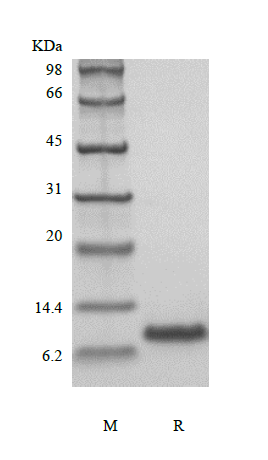- Synonyms
- CXCL 8, Emoctakin, GCP-1, MDNCF, MONAP, NAP-1, Protein 3-10C, T-cell chemotactic factor
- Source
- Escherichia coli.
- Molecular Weight
- Approximately 8.9 kDa, a single, non-glycosylated polypeptide chain containing 77 amino acids.
- Size
- 5µg/ 100µg/ 500µg/ 1mg
- AA Sequence
- AVLPRSAKEL RCQCIKTYSK PFHPKFIKEL RVIESGPHCA NTEIIVKLSD GRELCLDPKE NWVQRVVEKF LKRAENS
- Purity
- > 96 % by SDS-PAGE and HPLC analyses.
- Biological Activity
- Fully biologically active when compared to standard. The ED50 as determined by a chemotaxis bioassay using human CXCR2 transfected mouse BaF3 cells is less than 2 ng/ml, corresponding to a specific activity of > 5.0 × 105 IU/mg.
- Physical Appearance
- Sterile Filtered White lyophilized (freeze-dried) powder.
- Formulation
- Lyophilized from a 0.2 µm filtered concentrated solution in PBS, pH 7.4.
- Endotoxin
- Less than 1 EU/µg of rHuIL-8, 77a.a./CXCL8 as determined by LAL method.
- Reconstitution
- We recommend that this vial be briefly centrifuged prior to opening to bring the contents to the bottom. Reconstitute in sterile distilled water or aqueous buffer containing 0.1 % BSA to a concentration of 0.1-1.0 mg/mL. Stock solutions should be apportioned into working aliquots and stored at ≤ -20 °C. Further dilutions should be made in appropriate buffered solutions.
- Stability & Storage
- Use a manual defrost freezer and avoid repeated freeze-thaw cycles.
- 12 months from date of receipt, -20 to -70 °C as supplied.
- 1 month, 2 to 8 °C under sterile conditions after reconstitution.
- 3 months, -20 to -70 °C under sterile conditions after reconstitution.
- Usage
- This material is offered by Shanghai PrimeGene Bio-Tech for research, laboratory or further evaluation purposes. NOT FOR HUMAN USE.
- SDS-PAGE

- Reference
- 1. Modi WS, Dean M, Seuanez HN, et al. 1990. Hum Genet. 84:185-7.
2. Wolff B, Burns AR, Middleton J, et al. 1998. J Exp Med. 188:1757-62.
3. Utgaard JO, Jahnsen FL, Bakka A, et al. 1998. J Exp Med. 188:1751-6.
4. Van Damme J, Rampart M, Conings R, et al. 1990. Eur J Immunol. 20:2113-8.
- Background
- Interleukin-8 (IL-8) is encoded by the IL8 gene and produced by macrophages and other cell types such as epithelial cells. It is also synthesized by endothelial cells, which store IL-8 in their storage vesicles. There are many receptors capable to bind IL-8, the most affinity to IL-8 are receptors CXCR1, and CXCR2. As a member of the CXC chemokine family, function of IL-8 is the induction of chemotaxis in its target cells, like neutrophil granulocytes, basophils, and T-cells. IL-8 (72a.a.) has a 5-10fold higher activity on neutrophil activation, compared to IL-8 (77a.a.). IL-8 is often associated with inflammation, it has been cited as a proinflammatory mediator in gingivitis and psoriasis.










 COA Application
COA Application


